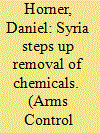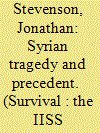|
|
|
Sort Order |
|
|
|
Items / Page
|
|
|
|
|
|
|
| Srl | Item |
| 1 |
ID:
130372


|
|
|
|
|
| Publication |
2014.
|
| Summary/Abstract |
Syria has picked up the pace in removing its chemical weapons materials for overseas destruction and has sent about half of its stockpile out of the country, according to figures in a March 20 press release from the Organisation for the Prohibition of Chemical Weapons (OPCW). Syria had been under broad international pressure to speed up the effort. By the end of February, it had made four shipments, removing about 5 percent of its so-called Priority 1 chemicals and about 20 percent of the Priority 2 chemicals. Citing those figures, Robert Mikulak, the U.S. ambassador to the OPCW, had accused Syria of "continu[ing] to drag its feet." (See ACT, March 2014.) Under a schedule set last November by the OPCW Executive Council, the Priority 1 materials were supposed to leave the country by Dec. 31. All other materials that are part of the overseas destruction program were to leave by Feb. 5. The rest of the approximately 1,300 metric tons of chemical agents that Syria declared is to be destroyed within the country. The removal dates were set with an eye to a June 30 deadline for destruction of the chemical agents, which was established last September by the Executive Council and the UN Security Council. (See ACT, October 2013.)
|
|
|
|
|
|
|
|
|
|
|
|
|
|
|
|
| 2 |
ID:
130864


|
|
|
|
|
| Publication |
2014.
|
| Summary/Abstract |
If Washington's Syria policy succeeds, it will crystallise efforts to privilege diplomacy over the use of force and create a precedent other powers will be apt to follow. The United States' present Syria policy is perhaps the most vivid, and discomfiting, example of the Obama administration's realism. Its military forbearance, even in the face of a burgeoning humanitarian crisis (over 150,000 Syrians have died in just over three years) and the Assad regime's use of chemical weapons, has been resolute. Its focus on using diplomacy instead of military power has been firm, if vexing. These traits suggest three strategic clean breaks from the George W. Bush administration's post-9/11 policy. Firstly, they imply recognition by the US that major wars remain possible and cannot be subordinated to 'small wars' of choice. Secondly, they indicate that the counter-insurgency tools developed for expeditionary deployments to Iraq and Afghanistan have been rejected as instruments of policy. Thirdly, they subsume a determined effort at rapprochement with Iran and, more broadly, an approach to Middle Eastern affairs that is substantially less confrontational and heavy-handed.
|
|
|
|
|
|
|
|
|
|
|
|
|
|
|
|
|
|
|
|
|